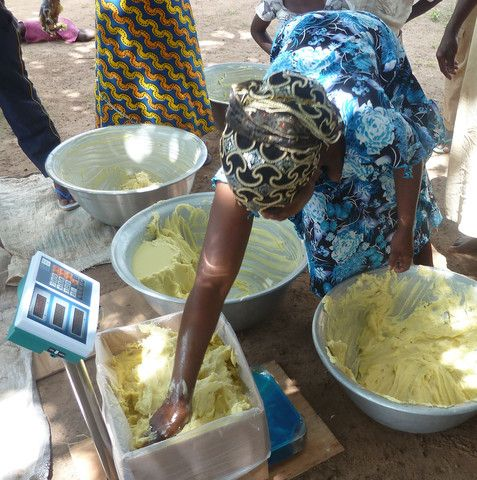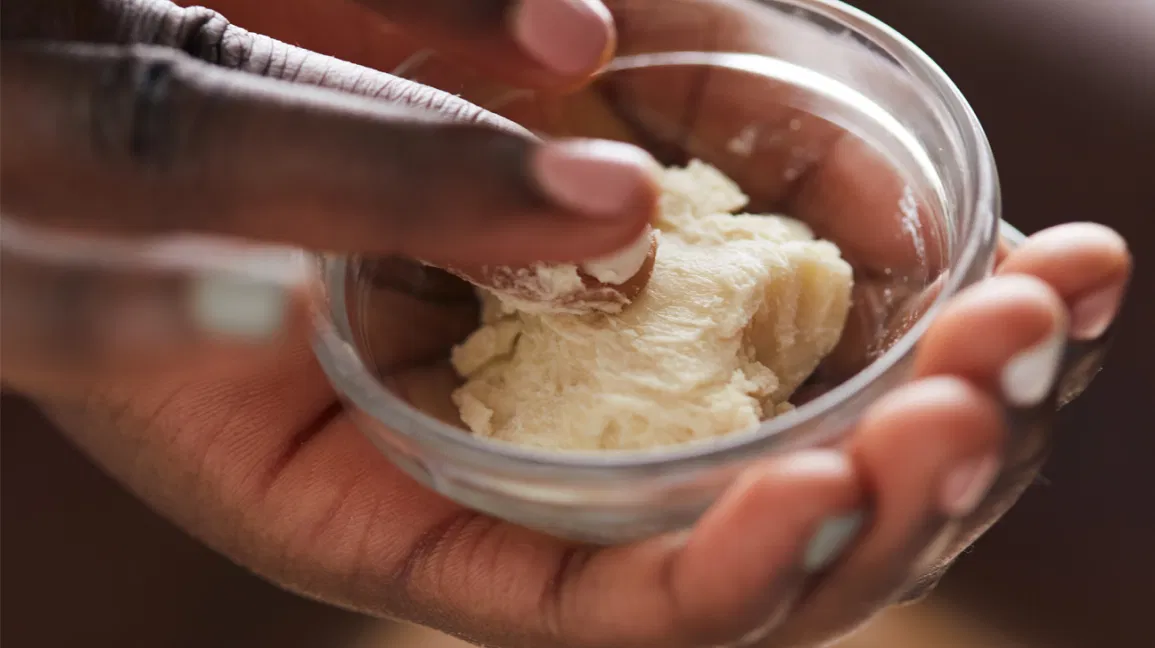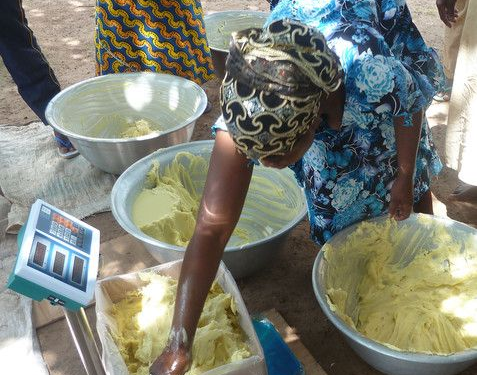Popularly known as ori in western Nigerians, Shea butter has been described as “Mother Nature’s Conditioner”. Shea butter is a natural fat that is derived from the nut of the Shea Tree, which has been termed the ‘Tree of Life’. These qualifications of the butter and its tree are all associated with its natural ability to address numerous health, hair, and skin conditions, and for its exceptional softening and moisturizing properties.
It has been used in cosmetics for centuries due to vitamins and fatty acids that hydrate and calm the skin. This longevity has enabled it to become a household name in the world of beauty and fashion. Its natural ability to nourish, sooth, and spread consistently makes it a natural way of pampering the skin. It has also long been used for health and cooking in Africa and is also an ingredient in a number of confections, especially chocolate.

How is it made?
Shea butter is made by boiling and crushing the shea tree nut. The discarded shells are then utilized as cooking fuel, while the seeds are split and roasted. These roasted seeds are then pounded with water to liberate their rich lipids. The fat extracts are cooked, skimmed, and chilled to produce the Shea butter we all know and love. At room temperature, it is a yellow-ivory tinted, buttery, thick, and solid material. When the shea nuts have cooled, they are removed from their shells.
Why is shea butter described as a gift to humanity?
The wonders of shea butter can not be overemphasized especially as relating to skin care. It is the new darling of the beauty and body care world
and it’s important that everyone begins to use it.
It’s Miraculous Components
Shea butter contains very important components which give it its benefits.These components are:
- Linoleic, palmitic, stearic, and oleic fatty acids, ingredients that balance oils on your skin.
- Vitamins A, E, and F, antioxidant vitamins that promote circulation and healthy skin cell growth
- Triglycerides, the fatty part of the shea nut that nourishes and conditions your skin
- Cetyl esters, the waxy part of the shea nut butter that conditions skin and locks in moisture.
Benefits of using Shea Butter:
Appropriate for nearly all Skins
One particular thing that stands out from other skin care creams is its strong appeal to work on all skin. It is not known to have any body side effects. Shea butter doesn’t contain chemical irritants known to dry out skin, and it doesn’t clog pores. Compared to other nut creams, it doesn’t cause allergies at least as researches have shown; this is because of its low protein content. There are no documented cases of topical shea butter allergies. However, as Science has shown, if you have a nut allergy, you can watch its reaction on your skin before by applying a little to some parts of your skin.
Naturally moisturizes, protects and heals the skin
Shea butter is excellent for the skin because its unique nutrition concentration helps moisturize the skin. These benefits are tied to shea’s fatty acid content – linoleic, oleic, stearic, and palmitic acids.It works for both dry and oily skin, and protects the skin from UV rays and sunburns, and hydrates skin.
At the same time, shea butter restores moisture to your skin and locks it into your epidermis, so your skin doesn’t dry out or feel “stripped” of oil. It also helps reduce the appearance of stretch marks and scars on the skin.
Shea butter also helps to soothe sunburn and other skin burns. Shea’s anti-inflammatory components may reduce redness and swelling. Its fatty acid components may also soothe the skin by retaining moisture during the healing process.

An Essential Hair Food.
Food is good for the body for growth and development; the work of shea butter on hair is akin to this. Shea butter helps treat dandruff, and related hair diseases. One way to treat dandruff is to restore moisture to your dry and irritated scalp. Shea butter’s soothing qualities help calm your scalp.
Shea butter is also known to prevent hair breakage. You can use shea butter to combat issues like dull, dry, and frizzy hair.
Shea butter cures minor burns and tough skin on feet
Stops Photoaging
Shea butter may help lessen what is referred to as photoaging – the wrinkles and fine lines that aging and environmental stress can cause on the skin. Shea butter contains a compound called triterpenes. These naturally occurring chemical compounds are thought to deactivate collagen fiber destruction. It does this by increasing collagen formation and encouraging new cell development. Collagen is a protein and is one of the main building blocks of our skin. It accounts for 30% of your body’s protein. It provides structure, support or strength to your skin, muscles, bones and connective tissues
Helps promote cell regeneration
Shea butter’s moisturizing and antioxidant properties work together to help your skin generate healthy new cells. Your body is constantly making new skin cells and getting rid of dead skin cells. Daily, your body gets rid of 30,000 to 40,000 old skin cells. When this happens, dead skin cells sit on the top, while new skin cells form at the bottom of the upper layer of skin (epidermis). When you apply some shea butter on your skin, it will eradicate the dead skin cells that are in the way of fresh cell regeneration in the epidermis.
Eases Skin Inflammation
If you’re looking for quick relief from skin-related issues like psoriasis, rosacea, acne and eczema, make shea butter your go-to product. Shea butter’s ability to penetrate the skin swiftly along with the presence of an anti-inflammatory agent like cinnamic acid and fatty acids will calm inflammation and give you relief. It’s also known to slow down the production of inflammatory cells that contribute to skin conditions and irritation. The presence of palmitic acid and oleic in shea makes it an excellent source to heal anti-inflammatory issues.
Forms of Shea Butter
Shea butter comes in two forms:
- Unrefined shea butter. This is shea butter in its pure, natural state.
- Refined shea butter. This is a product where the natural color and odor have been removed. As much as it looks and smells more appealing, 75% of its natural ingredients give shea butter its healthy properties might have been removed.
Choosing between refined or unrefined shea butter is mostly personal preference. However, while refined shea butter is moisturizing, it does not have the same amount of skin-calming benefits as unrefined shea butter. Now that you know the wonders of shea butter, kindly jump into your stores to purchase and start applying it on your body.









Discussion about this post